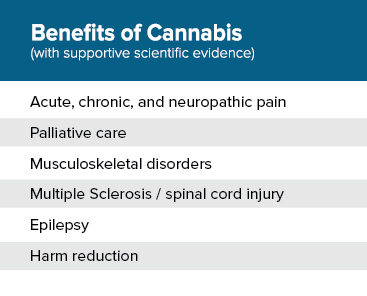While there are many potential benefits of cannabis use, it is not a panacea yet to cure all that ails use. There are certain medical conditions with good supportive scientific evidence that cannabis can improve symptoms while some show promise.
Benefits & Potential Benefits of Cannabis
Most of the negative effects attributed to cannabis have been established by research conducted on recreational users. Usually, this population has a long-standing history of smoking and/or other health and other drug related issues. There are few studies highlighting the toxicity profile in the medical users that are non-smokers and with no other relevant medical conditions.
Different strains of cannabinoids and terpenes are effective at treating different conditions. A cannabis product that is optimal for one individual may not be suitable for another person because of variables including genetics and individual medical conditions.
Reducing trial and error side effects from the use and prescribing of cannabis can occur by knowing your drug metabolism tendencies toward THC and CBD. Completing such a pharmacogenetics test will not only provide you and your prescriber this valuable knowledge but also inform you as to how cannabis will interact with other drugs that you consume, including alcohol and caffeine. Genetics testing can also offer insights about cannabis efficacy toward certain health conditions.
You should always discuss your Cannabis DNA results and recommendations with a medical professional who has experience in the use of medical cannabis in order to determine which CBD:THC ratio is optimal for you.
Scenarios to Avoid Cannabis
(THC Specifically)
Cannabinoids Hyperemesis Syndrome
A very rare diagnosis associated with chronic nausea and vomiting, in cyclical episodes that is often relieved with hot bathing. Some had speculated the cause of this could be due to pesticides found in some unregulated cannabis or chronic high THC use. However, genetics testing can now be done for this precise diagnosis.
Under the Age of 25
There are substantial discussions amongst cannabis medical experts as to whether cannabis harms the developing of the brain in individuals under the age of 25. Cannabis use from an early age (typically under 25 years of age) has been associated with delayed and impeded brain development. The data to date is mixed with some showing cannabis use early in life is associated with worsening mental health outcomes later in life.
History of Active Substance Use Disorder
Chronic use of high THC formulations can lead to tolerance and dependency, especially when smoked. This effect is worsened when combined with tobacco. About 10% of people will develop dependence use disorder.
Psychomotor and Cognitive Impairments
THC is associated with dose-dependent and acute impairment of psychomotor and cognitive skills. Chronic use can lead to decline in focus and memory functions. Recent data has contradicted these effects, with some showing that abstinence from cannabis restores baseline cognitive functioning. Acute use of THC can also cause motor impairment and an increase of motor vehicle accidents by 2-4 times. As with alcohol, cannabis should not be used when an individual is in safety sensitive position, driving a vehicle or operating machinery.
Pregnancy or Breast Feeding
Cannabis, especially chronic and high amounts of smoked THC, during pregnancy has been associated with lower birth weights. THC can be found in the breast milk of cannabis users and is not recommended for mothers’ breast feeding.
Unstable Mental Illness, History of Psychosis or Schizophrenia
THC is contraindicated in patients with documented history of psychosis. High doses or chronic usage of THC are associated with an increased risk of psychosis and schizophrenia, acute and transient behavioural changes, and anxiety. Genetics testing can support those at high risk and therefore can refrain from THC use.
Recent Heart Attack or Unstable Cardiac Condition
CBD may cause hypotension and decreased heart rate, where THC may increase blood pressure and increase the heart rate above normal.
Forms of Use and Variation of Effects
For individuals who are unaccustomed to cannabis use but who wish to consume cannabis for its therapeutic value, the general guideline is to begin slowly with lower dosages.
Strains
Your Cannabis DNA report contains recommendations that are based on chemical composition data for commercial cannabis strains. Although such data typically include THC, CBD and terpene levels, you should nevertheless verify the chemical composition of cannabis-derived items that you purchase from your local vendor.
Tinctures and Edibles
Your Cannabis DNA report contains recommendations that are based on the current data available for commercial cannabis products. Ask your local cannabis vendor whether he or she sells tinctures and edibles that have been laboratory tested. Tested products will have a known cannabinoid composition.
Cannabis-containing hard candies like lozenges and mints tend to remain in the mouth longer than food items that are immediately swallowed; thus, hard candies allow for increased cannabinoid absorption via the oral blood vessels.
Topicals (Creams, Ointments, Oils, Salves)
Discuss your options with a medical professional and apply topical products according to his or her instructions.




